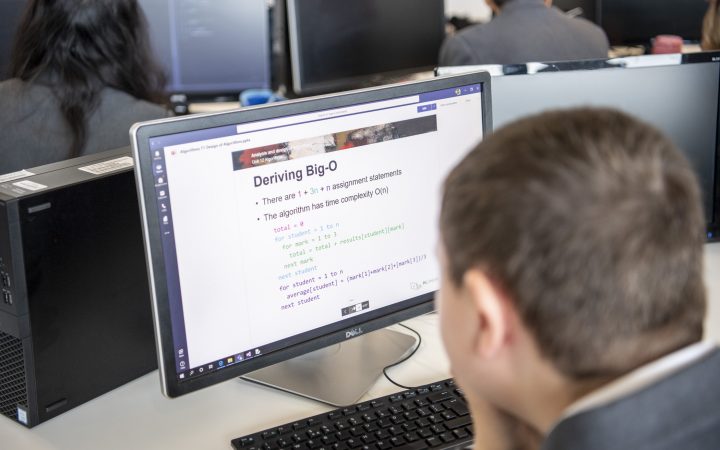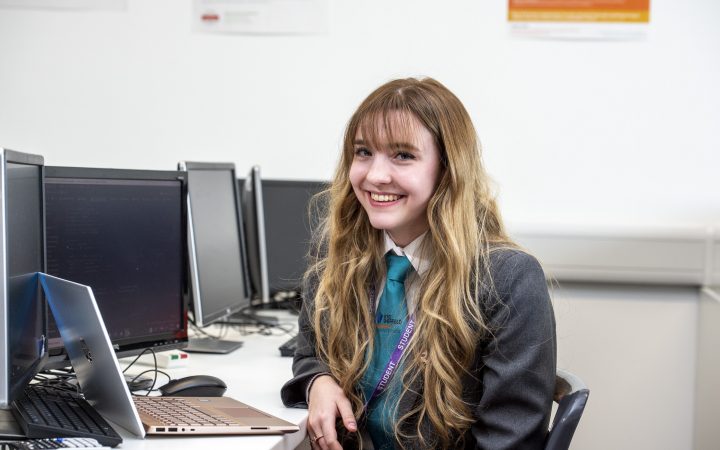
The UTC Olympic Legacy Park needs Sheffield companies to support its Computing department in creating a skilled workforce for the future. You could run single or regular sessions at the college to share your knowledge, skills and passion, or you can have this talented bunch of Computing students working on your next product or solution. We are also asking people in our community to make short videos about your job role; what you do and how you got there – to show the variety of jobs in Sheffield’s digital industries. Read on for more details and to hear from Ifatgar Ahmed, the new Curriculum Director for Computing at the UTC and Principal, Jess Stevenson, who explain how businesses in our community can benefit from working with their students.
Sheffield’s UTC Olympic Legacy Park is focussed on building a strong pipeline of talent across its specialisms of Health Science, Sports Science and Computing. The college is reaching out to employers in the digital community to work with them in shaping the future workforce and in return, gain access to some of the region’s most talented young people specialising in app development, cyber security, gaming and programming.
Mirroring industry
The UTC – which is located in the heart of the growing health-tech campus at the Olympic Legacy Park – compares itself more closely to a university or a tech business than a school, when it comes to the standard of equipment, qualifications and overall learning environment. Ifatgar Ahmed, who joined the UTC as Curriculum Director for Computing in April, has spent his first months expanding the qualifications he can offer students. He has become a certified trainer for global cyber security experts Palo Alto and is setting the UTC up as a Microsoft academy, so he can deliver Microsoft Technical Associate qualifications.
Ifatgar’s approach is to ‘mirror’ industry so that his students are ready to take what they learn at the UTC, straight into a workplace. He explains,
“A student asked me recently what language we use at the UTC, and if it was just Python. Most schools will work with Python because it’s what the teachers know, the exam boards push it and it is the language used by Google. However, if you are a business you wouldn’t just use Python because that’s the only language you’ve been taught – you use the language that is most appropriate to get that job done. If you are producing a computer game Python would not be a good language to use, whereas if you were doing data mining, Python would be our choice of language. So, we are trying to mirror how this works in industry.”
Students of Computing at the UTC are highly skilled in their field and have high expectations for their learning. Ifatgar continues,
“Our students are very focussed and driven in their specialisms. My A-level students are all into programming – they’ve been doing it at home since they were little. They all have a different interest – not everyone wants to do gaming or data mining – and we want to keep that interest alive so we don’t have to worry about them losing motivation.
“So, I’m building a team of teachers who specialise in different fields. I have three programmers with various different interests; one who is into robotics, another who is very into VR and gaming, and I have a programmer who will be looking at development of languages. My own background is computer architecture and hardware, so I’m more into networking and developing the cyber security side of things. I want to use the skill set and passions that these people have come with and harness that, rather than delivering a generic curriculum.”

Shape the skills of your future workforce
Through links with employers in the region, the UTC is able to give students exposure to professional environments, to help them understand the range of jobs in their field of specialism and the chance to apply their skills to real projects.
The UTC wants to enhance the Computing curriculum even further by developing partnerships with tech and digital businesses in the region. Employer engagement can range from mentoring students on individual projects, to speaking about your business in one-off or regular visits and showcasing the types of roles you have at your workplace. Ifatgar is keen for businesses to engage his students on real commissions, to develop a product or solution. He says,
“I’d like businesses to be clients to the students; to come to us with a specification and once they have developed it, for those clients to come back in for testing, evaluation and feedback. It’s really important for these young people to know they are working on something that could be used in real industry. My A-Level students are as industry-ready as anybody is going to be – they know their subject inside out and I am confident that they can deliver whatever a business wants.”
Jess adds,
“Computing offers so much creativity and potential, I never cease to be amazed at the projects our students complete. Too often young people’s abilities are underestimated but at the UTC we put no ceiling on the possibility. So the outcome of employer-led projects is often better than anyone imagined it would be.”
To give Computing students a fully rounded experience, Ifatgar is also looking to the business community to share particular skills and specialisms.
“I hope we can set up skills sessions where someone comes in from industry within a particular field to talk to students and perhaps take them through a practical task. For example, we use Microsoft but that’s not the only system out there – many organisations use Mac and Linux. If there was someone who is passionate about Linux, and would come and run a lab session on it, then that’s a whole new world that is being used by industry and it would be good for our students to get exposure to it.”
In return, employers can help to shape what is taught to the future workforce of the tech industries. You also get early access to some of the region’s most skilled and passionate young people in the field of computing and have a captive audience to showcase what your company has to offer them.

The UTC Olympic Legacy Park wants to hear from companies that would like to get involved with its work. You can contact Ifatgar directly on email to arrange a conversation and potentially a visit to the UTC once it is safe to do so, following the COVID-19 lockdown.
Share your story
The UTC is keen to show current and prospective students exactly what the digital industries look like in Sheffield City Region and just how many different types of jobs there are.
The Sheffield Digital community has an important role to play here – so we are asking you to submit a short video in which you introduce yourself , where you work, what your job is and how you got there. This isn’t just for the developers out there (although we definitely want to hear from you!) – it’s an opportunity to show that jobs in the digital industries include project managers, testers, receptionists, account managers, marketers, content creators and much, much more!
You can download a guide to creating and submitting these videos and a consent form for future use of the video here.